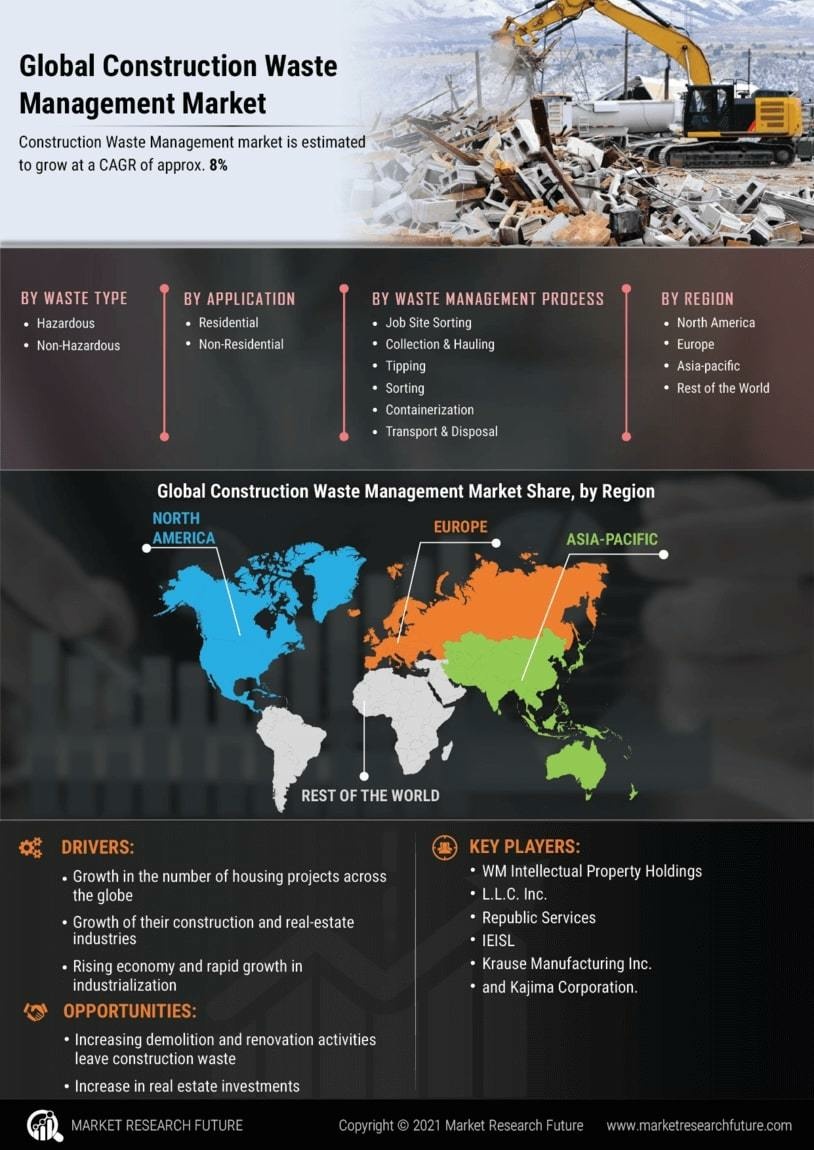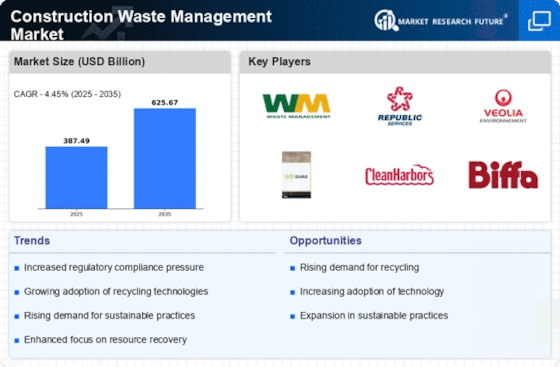Market Growth Projections
The Global Construction Waste Management Market Industry is projected to experience substantial growth in the coming years. With an expected market value of 18.9 USD Billion in 2024, the industry is on a trajectory towards reaching 34.4 USD Billion by 2035. This growth is underpinned by a compound annual growth rate (CAGR) of 5.56% from 2025 to 2035. Such projections highlight the increasing recognition of the need for effective waste management solutions in the construction sector. The anticipated expansion reflects a broader trend towards sustainability and resource efficiency, as stakeholders seek to minimize waste and enhance recycling efforts.
Technological Advancements
Technological innovations play a pivotal role in enhancing the efficiency of waste management processes within the Global Construction Waste Management Market Industry. Advanced technologies such as Building Information Modeling (BIM) and automated sorting systems facilitate better waste tracking and recycling. For example, BIM allows for precise material estimation, reducing excess waste during construction. Additionally, automated sorting technologies improve the separation of recyclable materials from waste streams. These advancements not only streamline operations but also contribute to cost savings for construction firms. The integration of technology is anticipated to propel the market's growth, aligning with the projected CAGR of 5.56% from 2025 to 2035.
Economic Growth and Investment
Economic growth and increased investment in construction projects are vital factors driving the Global Construction Waste Management Market Industry. As economies recover and expand, construction activities intensify, leading to higher waste generation. For instance, emerging economies are experiencing a surge in infrastructure projects, which contributes to waste accumulation. This scenario compels stakeholders to implement effective waste management strategies to mitigate environmental impacts. Consequently, the market is poised for growth, with projections indicating a rise to 18.9 USD Billion in 2024. The correlation between economic activity and waste generation underscores the importance of robust waste management systems.
Growing Environmental Awareness
Increasing environmental awareness among stakeholders is significantly impacting the Global Construction Waste Management Market Industry. As public concern regarding climate change and resource depletion rises, construction companies are under pressure to adopt sustainable practices. This shift is evident in initiatives promoting green building certifications, which often require effective waste management strategies. For instance, the Leadership in Energy and Environmental Design (LEED) certification encourages waste reduction and recycling during construction projects. Consequently, the market is expected to expand as firms prioritize eco-friendly practices, contributing to the anticipated growth to 34.4 USD Billion by 2035.
Regulatory Frameworks and Policies
The Global Construction Waste Management Market Industry is increasingly influenced by stringent regulatory frameworks and policies aimed at reducing waste generation. Governments worldwide are implementing laws that mandate recycling and proper disposal of construction waste. For instance, the European Union's Waste Framework Directive sets ambitious recycling targets, which compel construction firms to adopt sustainable practices. This regulatory pressure is expected to drive the market, as companies invest in waste management solutions to comply with legal requirements. As a result, the market is projected to reach 18.9 USD Billion in 2024, reflecting the growing importance of regulatory compliance in shaping industry dynamics.
Urbanization and Infrastructure Development
Rapid urbanization and infrastructure development are key drivers of the Global Construction Waste Management Market Industry. As populations grow in urban areas, the demand for housing and infrastructure projects surges, leading to increased construction activities. This escalation generates substantial amounts of waste, necessitating effective waste management solutions. For example, cities in developing regions are witnessing unprecedented construction booms, resulting in significant waste generation. To address this challenge, governments and private sectors are investing in waste management systems. This trend is likely to bolster the market, aligning with the projected growth trajectory towards 34.4 USD Billion by 2035.
























